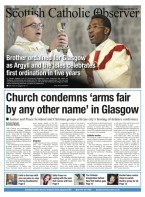May 23 | ![]() 0 COMMENTS
0 COMMENTS ![]() print
print

Pope brings respect to the Middle East
Holy Father begins pilgrimage to the Holy Land
Pope Francis is taking a Jewish Rabbi and Muslim Sheikh with him to the Middle East this week, in a powerful message of interfaith respect.
It will be the first time that leaders of other faiths have been made part of an official Papal delegation. The aim is to send ‘an extremely strong and explicit signal’ about interfaith dialogue and the ‘normality’ of having friends of other religions, chief Vatican spokesman Fr Federico Lombardi told reporters.
Starting the three-day pilgrimage will take the 77-year-old Holy Father to Jordan, the West Bank and Israel.
The packed agenda includes courtesy calls on government leaders; open-air Masses; meetings with Christian,
Muslim and Jewish religious authorities; and visits to holy sites of the three religions.
The two men joining the Pope are friends with whom he frequently collaborated with when he was the archbishop of Buenos Aires: Rabbi Abraham Skorka, former rector of the Latin American Rabbinical Seminary in Buenos Aires, and Sheikh Omar Abboud, a former secretary-general of the Islamic Center of Argentina.
“I don’t expect Francis to wave a magic wand and bring together Jews and Palestinians,” Rabbi Skorka said. “But his charisma and his great humility can give a powerful message of peace for the whole Middle East.”
Eric Greenberg, the director of communications, outreach and interfaith for the Multi-Faith Alliance for Syrian Refugees, said that the Pope’s ability to captivate world media means every step of his visit will be watched closely.
“There will be opportunities to deepen the important bilateral relationship between Catholics and Jews, and to boost the larger dialogue among Catholics, Jews and Muslims,” Mr Greenberg said.
The Holy Father will begin his trip in Jordan, where he will meet the Jordanian royal family and celebrate Mass in the
International Stadium in Amman. He will proceed the next day by helicopter to Bethlehem for a 6 1/2-hour stay. He will meet there with Palestinian officials, celebrate an open-air Mass in Manger Square and visit with children from
Palestinian refugee camps.
From Bethlehem, the Pope will fly by helicopter to Ben Gurion Airport and then to Jerusalem. He will visit the Yad Vashem Holocaust Centre and the Western Wall, where like his predecessors Pope Emeritus Benedict XVI and Pope John Paul II, he will leave a message in a crack between the stones. The Holy Father also will visit Christian sites and the Temple Mount.
Pope Francis will be the fourth reigning Pope to visit Jerusalem. His trip marks the 50th anniversary of the first Papal visit to the Holy Land— Pope Paul VI’s pilgrimage in January 1964. On the trip, Pope Paul’s meeting in Jerusalem with Patriarch Athenagoras, the spiritual leader of Orthodox Christians, was a major first step toward reconciling the 1000-year rift between Western and Eastern Christianity.
The centrepiece of the Pope’s stay will be his meeting with Ecumenical Orthodox Patriarch Bartholomew and an ecumenical joint prayer service with leaders of other Christian churches in the Basilica of the Holy Sepulchre in Jerusalem.
For the past 20 years, Israel and the Holy See have attempted to reach agreement on several outstanding bilateral issues, including establishing the juridical rights of the Catholic Church in Israel as well as regulating property and taxation issues.
Just ahead of the Pope’s visit, Israeli officials quashed rumours that Israel planned to transfer the Cenacle, the site where Jesus’ Last Supper took place, to the Vatican. The Holy Father will celebrate Mass at the Cenacle, which is revered by Christians.











